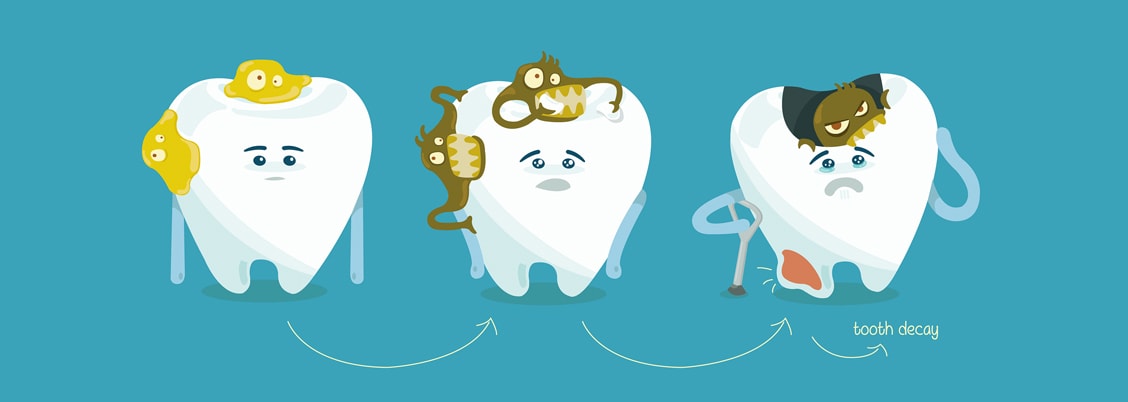
You finally make a dental appointment after weeks of a nagging toothache. As the dentist reviews your digital X-rays, he breaks the dreaded news to you: you have a cavity. As questions dance through your mind, you realize you know very little about tooth decay. What is a cavity? Are some people more susceptible to developing tooth decay than others? Are there symptoms of decay other than pain? Even though cavities are common, most people know surprisingly little about tooth decay.
What is tooth decay?
First thing’s first: what exactly is tooth decay anyway? Tooth decay– perhaps more commonly known as a cavity– is a hole in the tooth. Cavities are the result of bacteria in the mouth producing acids that eat away at the teeth. Not all cavities are the same, however. Some only impact the outer layer of the tooth, known as the enamel. Others progress to the dentin, which is the middle layer. The most severe cavities progress all the way to the pulp, which is the center of the tooth and contains the nerves. Not surprisingly, cavities impacting the pulp require the most extensive restoration.
What are the symptoms of tooth decay?
The most common symptom of tooth decay, of course, is tooth pain. But pain isn’t always present when tooth decay is. Other possible indicators of tooth decay include:
- Gum swelling in the vicinity of a particular tooth.
- Chronic bad breath.
- Tooth discoloration; in particular, brown or black spots on the teeth.
What causes tooth decay?
So, what could possibly cause a person to develop a hole in her tooth? The culprit behind tooth decay is plaque, which is a sticky film that is constantly forming over the teeth. Bacteria is abundant in plaque. When you eat– and particularly when you indulge in sugary foods– the bacteria in plaque feeds on the sugars. The result of these feeding sessions is the creation of acid, which then eats away at the tooth’s enamel.
Some people are more likely to have cavities than other people. Risk factors for tooth decay include:
- Poor oral hygiene. Because plaque is constantly forming on the teeth, good oral hygiene is crucial to preventing tooth decay. If you neglect to brush twice a day or forego flossing, you’re much more likely to develop cavities.
- Overindulgence in sugar-loaded foods. The bacteria in plaque feast on sugars, so it makes sense that diets heavy in sugar put you at a greater risk of developing tooth decay.
- Dry mouth. It might seem odd that a dry mouth can lead to tooth decay, but saliva plays a major role in cavity prevention. Why? Saliva, the mouth’s natural lubricant, washes away food particles for us between meals. People with dry mouth don’t produce an adequate amount of saliva, which results in food particles and sugars being left behind on the teeth. Dry mouth can be caused by side effects from medications or by certain medical conditions.
- Lack of fluoride. Fluoride– a naturally occurring mineral– is a tooth’s best friend. That’s because fluoride strengthens the tooth’s enamel, thereby helping to protect it from decay-causing acids. If your toothpaste isn’t fluoridated, it’s time to switch brands. Additionally, public water sources often have fluoride added to them, so make sure to drink plenty of water.
- Smoking. It’s no secret that smoking is harmful to your overall health. What’s less commonly known, however, is that smoking can be detrimental to your oral health too. Besides causing staining and putting you at increased risk of developing gum disease, smoking causes plaque and tartar to build up on the teeth– thereby also increasing the risk of tooth decay.
Are you concerned that you might have a cavity? Don’t put off a visit to your dentist any longer. The earlier you seek treatment, the less likely it is that your cavity will progress into a more serious oral health concern. Contact Caputo Dental to learn more!